Twenty years ago, Air Cargo Update took a bold step to enter this niche industry publication. It was a remarkable journey of ups and downs as air cargo and its supply chain swung back and forth to the demands of the day punctuated by today’s unforeseen impact of the Coronavirus pandemic.
To mark our historic journey, we’ll bring you some of our best features from the past two decades, the movers and shakers with their insights and decisions that helped shape today’s air cargo industry.
More than a decade ago, IATA advocated for the gradual digitalization of the industry starting with the use of e-AWB.
In this edition, let’s look back at Shashi Panicker, Head of Cargo at Sharjah Aviation Services, as he discussed with ACU in 2012 the many benefits of the e-AWB and e- freight and why so many companies are struggling to adopt to the changes.
With e-Air Waybill (e-AWB) and e-freight deadlines looming over the air cargo industry, Air Cargo Update takes a look at the e-AWB and the status of its implementation across the globe and in the Middle East in particular. Shashi Panicker, Head of Cargo at Sharjah Aviation Services shared with us his views on the subject
In an effort to change the way aviation industry operates and improve the aviation and air cargo standards globally, the International Air Transport Association (IATA) has been advocating changes on various fronts through its simplifying the business programme. IATA is currently working within Global Air Cargo Advisory Group (GACAG) on e-commerce, security, customs and trade facilitation and sustainability.
The organisation is facilitating these collective cargo industry initiatives with the ultimate goal of bringing in sustainability to the sector.
In the current environment, the transportation of air cargo still involves a whole lot of paper documents. Therefore, IATA is focusing on the need for the air cargo sector to tackle e-freight; and rather than asking the industry to do all at once, the body has set deadlines to first achieve 100% implementation of e-AWB in a phased manner. The air waybill (AWB) is a key document in air cargo transport and an e-AWB is a first step towards creating a paperless environment.
Developed in collaboration with industry stakeholders, the e-AWB removes the requirement for paper AWB, which
significantly simplifies the air freight supply chain process.
The benefits of doing away with the large number of paper documents required for air cargo shipments as identified by industry stakeholders are: reduced paper use and need to print, handle and archive paper AWBs; simplified data entry and maintenance; reduced transfer times; and real-time access to bill date for all personnel. All these add up to bring about overall efficiency in the operations, and in the long term, result in significant cost savings for the air cargo and logistics sectors. In fact, IATA has estimated that this could translate into about US$4.9 billion of industry saving.
The challenge has been that countries worldwide have been slow in implementing e-commerce solutions. In the Middle
East, the implementation of e-freight and e-AWB has been much slower than anticipated. There is a need for various
stakeholders in the industry to come together to device a smart mechanism wherein a successful model can be drawn
up for the speedy implementation of the e-AWB.
Shashi Panicker, Head of Cargo at Sharjah Aviation Services enumerated the reasons for the slow rate of implementation of the e-AWB in the region.
In his view, the air cargo industry is relying heavily on paper documentation even today for a few reasons:
• The implementation of e-AWB and e-freight requires major investment in terms of time, technology and money
• Secondly the stakeholders are to agree the industry benefits and come forward with the required changes and investments, the world wants to comply.
On the benefits of e-AWBs, the Cargo Head said there were many benefits including reduced costs; higher productivity; better reliability; regulatory compliance; reduced cargo handling delays; paving the way towards e-freight; realtime access to AWB information; and elimination of the requirements to file paper AWB. When asked as to whether e-freight could be seen as a total solution, Panicker said, “e-freight can be a solution as it aims to take paper documents out of air cargo and replace it with the exchange of electronic data and messages that would lead to the following benefits: lower costs, faster supply chain transit times, greater accuracy, regulatory compliance, increased security, and it is better for the environment.”
“But, e-freight cannot replace paper documentation totally. Only 20 paper documents can be replaced with electronic
messages. The remaining documents are not in scope of e-freight, as they are not currently supported by international standards,” he continued.
With specific reference to Sharjah Aviation Services as well as the cargo carriers operating from Sharjah Airport, Panicker said they had not yet fully adopted the e-AWB, which are through FWB and FHL. “Implementation of the e-AWB is not an easy process and requires a whole system change which calls for investment, tremendous effort and coordination among various authorities and other stakeholders who are involved in the air cargo supply chain, to which we remain committed.”
In Panicker’s opinion, the major challenges in switching over to e-AWB in the Middle East are: (a) The ability of their customers to electronically transmit FWB and FHL through their system which are SITA enabled on SHJFFXH (b) The governing bodies to accept paperless transaction as the means of approval (b) System change, which requires the implementation of standardised electronic data interchange.
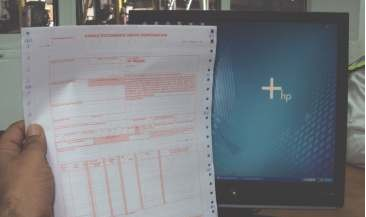 The stakeholders involved in the air cargo supply chain are Shippers, Airlines, Forwarders and Ground Handlers. The airlines, he said, “have to take the lead to implement e-AWB with the forwarders; and forwarders should support airlines for e-AWB rollout by means of FWB and FHL messages to the handling company. To this end they have to trust EDI Agreement from the airline; own the responsibility to send FWB and FHL data; and cutover according to airline set target date.”
The stakeholders involved in the air cargo supply chain are Shippers, Airlines, Forwarders and Ground Handlers. The airlines, he said, “have to take the lead to implement e-AWB with the forwarders; and forwarders should support airlines for e-AWB rollout by means of FWB and FHL messages to the handling company. To this end they have to trust EDI Agreement from the airline; own the responsibility to send FWB and FHL data; and cutover according to airline set target date.”
“This of course improves the ground time while serving the customer,” said Bradley Boyd, Senior Cargo Operations
Manager, Sharjah Aviation Services, who believes is ground breaking for a traditional process which is long followed by the industry.
The Cargo Head stressed that it was important that the stakeholders cooperate and agree on the implementation
of the e-AWB. And how can they achieve that? “First the airlines, shippers and ground handlers should have a clear
understanding of the benefits in implementing e-AWB bills. Only then, all the stakeholders will have the same goal to effectively implement the e-AWB.”
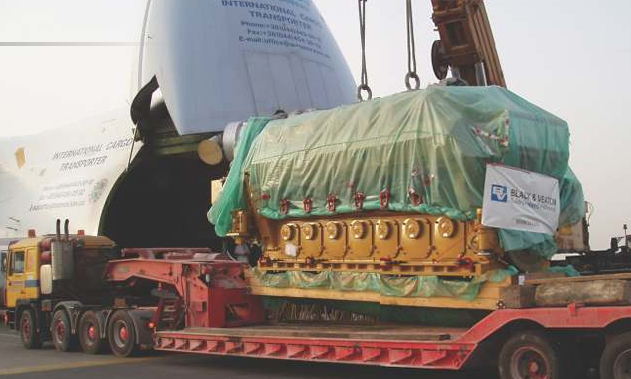 IATA has set the targets for airlines and freight forwarders with regard to e-AWB, with the aim of achieving 15% e-AWB implementation by 2012, 70% by 2013 and 100% by 2014.
IATA has set the targets for airlines and freight forwarders with regard to e-AWB, with the aim of achieving 15% e-AWB implementation by 2012, 70% by 2013 and 100% by 2014.
Did Panicker think this could be achieved in the Middle East or in the UAE within the set time frame? “Yes. As the leading airlines like Emirates SkyCargo have already taken the initiative in implementing e-AWB, it is not impossible for other airlines/ forwarders and ground handlers in the UAE to follow suit and achieve the full implementation of e-AWB,” he commented.
Positive developments
On the positive side, significant strides have been made by key players in some countries with regard to e-freight, which could induce more players to follow suit, going by the success rate of implementation of these initiatives by some key stakeholders.
Cathay Pacific Airways was one of the first airlines to switch to 100% e-AWB in Hong Kong, having removed paper AWBs totally from its Hong Kong International Airport hub in January 2011. Cathay Pacific introduced e-AWBs in Singapore and Malaysia in the first quarter of 2012.
Likewise, Hong Kong Air Cargo Terminals Ltd (Hactl) has also made a great deal of progress in e-freight initiatives, having completed the final phase of implementation of its fully e-freight-enabled COSAC-Plus cargo management system in April this year. All the 91 airline customers handled by Hactl have transferred smoothly onto the new system.
In the Middle East, Emirates SkyCargo has taken the lead role in spearheading the e-freight agenda regionally and
globally. In addition to eliminating paper air waybills in Dubai with the use of e-AWBs on all shipments out of its hub, the cargo carrier marked a milestone with its inaugural 100% paperless freighter flight between Nairobi and Amsterdam in April 2011. This indicates a significant step towards working in a completely electronic environment that will enhance operational efficiency to the supply chain. It is notable that 51 of the 111 cities Emirates SkyCargo serves are e-freight compliant.
In fact, the Dubai Customs have been very proactive in this area and are keen on electronic clearances. Within the Emirates Group there are several companies that have similar objectives. The ground handling agency dnata is doing a lot in this on the ground. Calogi, launched in Dubai mid-2008 to facilitate a comprehensive and integrated business environment for the air cargo supply chain community, has been one of the most successful trading platforms. Through this cost-effective portal designed for small-to-medium enterprises, freight forwarders can effectively do business with trading partners such as the cargo terminals, airlines and 3PLs.
Calogi allows people to trade in a seamless environment and has made Dubai (DXB) and Al Maktoum airports (DWC)
easier places to do business with.
There are several elements involved in the cargo transportation process where paper is required, and achieving 100 per cent e-freight is being dictated by various governmental clearance processes, with most of them still requiring a lot of paperwork.
Again, considering that many stakeholders and countries are involved in the supply chain and the border control
processes that come into play, one of the key requirements is the ratification of the Conventions. Unless the countries involved are in line with the agreements, it would be difficult for the stakeholders to go digital. If one country is on MP4 and the other has ratified MC99, it reverts back to 1928 Warsaw Convention which is a paper-based transaction and therefore a barrier to e-AWB. So the ratification of all these conventions is important for all cargo players.
The air cargo sector in the UAE is fortunate in that the country has ratified both MP4 and MC99. So they can transact with both parties, which is an advantage.
IATA is working with airlines, the national carriers and governments in an effort to achieve the set targets on time. Going by the current developments, in addition to many other global initiatives with regard to e-freight and e-AWBs, IATA’s vision of achieving 100% e-AWB for the complete cycle of the shipment on feasible lanes by end 2014 may well be realised.
Note: Air Cargo Update will be following closely the developments in the Middle East with regard to e-AWB and
e-freight to provide regular updates to our readers.
Qatar Airways Cargo recently surpassed a milestone with 10 million COVID-19 vaccines transported, including COVID-19 vaccines for UNICEF as part of the five-year MoU to support UNICEF’s Humanitarian Airfreight Initiative.
The airline has played a significant role throughout the pandemic and is committed to helping people and giving back to communities, in alignment with its sustainability program. Since December 2020, Qatar Airways Cargo has transported COVID-19 vaccines to twenty countries all over the world including Algeria, Cambodia, Denmark, Pakistan Rwanda, South Africa, the Netherlands, to name a few. Thanks to the dedication and hard work of its global teams and ground handling partners, the carrier has provided large populations in several countries access to vital vaccines.
Guillaume Halleux, chief officer cargo said, “I am both, proud and humbled to support the vaccines distribution and helping UNICEF to reach the maximum number of people, everywhere. We remain committed and resilient in the fight against the pandemic and together with our partners, we will ensure the safe, timely and efficient transportation of these life-saving supplies.”
Qatar Airways Cargo, the freight division of Qatar Airways has signed an MoU with UNICEF for a five-year period to support UNICEF’s Humanitarian Airfreight Initiative. Qatar Airways Cargo will work closely with UNICEF and its freight forwarders to prioritize the transport of vaccines, medicines, medical devices and critical supplies utilizing its extensive global network and capacity.
Through its QR Pharma product, Qatar Airways Cargo offers controlled cool chain and dedicated monitoring, intervention and servicing as well as proactive re-icing at its Doha hub. With these significant investments, the cargo carrier confirms its strategy and commitment to supporting the logistics around the global COVID-19 vaccination endeavor.
The transportation of vaccines will continue in the coming months to more countries around the world via the carrier’s scheduled and charter flights and freighters.
Kenya-headquartered freighter operator Astral Aviation has selected Sharjah Airport as its Middle East hub as it expands its operations in the region.
The hub, chosen for its ‘strategic location’ – as well as its facilities for general cargo, perishables and pharma handling – is the Astral’s third. The carrier also has its headquarters in Nairobi and a Europe base in Liege.
Astral Aviation is operating two flights per week from Nairobi to Sharjah, using Boeing 767 freighter aircraft.
Sanjeev Gadhia, founder and chief executive of Astral Aviation, said, “We are truly honored to enter into an agreement with Sharjah Airport which will become Astral’s Middle Eastern Hub, and its third global hub after Nairobi, Kenya and Liege, Belgium”.
He added: “We will provide a scheduled service for perishables from East Africa to Sharjah for the UAE region, while on the return, Astral’s consolidations from Chin and the UAE will be moved from Sharjah to Nairobi for onward connection to Astral’s intra-African network.
“The introduction of the new freighter service between Kenya and UAE will result in an increase in trade and new opportunities for the private sector with direct connectivity which will benefit both countries.”
Ali Salim Al Midfa, chairman of Sharjah Airport Authority, added, “Sharjah Airport continues to attract new airlines and routes, such as Astral Aviation, which cements our leading position as an international hub for freight.
“Agreements such as this also confirm our commitment to providing the highest international standards and practices for the air cargo sector through specialized warehousing, which has obtained CEIV accreditation from the International Air Transport Association (IATA). We look forward to employing our full logistical capabilities and working with Astral Aviation to ship Covid-19 vaccines from China to the African continent in an efficient and smooth manner.”
Al Midfa added: “The advanced infrastructure provided by the airport, and the support air freight systems that connect the cargo center to all international destinations, constitute a qualitative addition, especially since Sharjah Airport has proven its efficiency and ability to quickly respond to cargo operations that need special attention in terms of handling, shipping and storage.”
On the occasion of World Wildlife Day, the Emirates Group has reaffirmed its long-standing commitment to protecting wildlife and habitats. It also shone the spotlight on conservation efforts across the organization at an online Environment Forum for its global employees.
During the forum, experts from the Dubai Desert Conservation Reserve, Emirates One & Only Wolgan Valley in Australia, and Emirates SkyCargo spoke about the work being done to protect endangered species and habitats in Dubai, restoration efforts following aftermath of the Australian bushfires, and how the airline was doing its part to foil wildlife trafficking across its network.
In addition to reducing emissions and consuming responsibly, the preservation of wildlife and habitats is one of the three pillars under The Emirates Group’s environmental sustainability strategy. The Group believes that future generations should enjoy seeing wildlife in the wild, and that the world’s beauty and biodiversity is an inspiration for travel.
Since 2003, The Emirates Group has funded and supported the 225 square kilometer Dubai Desert Conservation Reserve (DDCR), a protected inland desert habitat that houses over 560 different species and where 31,000 native trees have been planted. DDCR plays an important role in preserving Dubai’s unique desert environment including its indigenous flora and fauna.
Amongst its achievements, is DDCR’s successful reintroduction program that started in 1999. Since then, the program has grown the ungulate population- including the Arabian oryx, Arabian gazelle and sand gazelle, to over 1,300. In fact, the reintroduction programs have proved so successful that they have triggered the process of relocating some species to other protected areas within the region. Additionally, over 2,800 houbara, or MacQueen’s bustard have been reintroduced into the DDCR, while other important bird species such as the pharaoh eagle-owl and the lappet-faced vulture are resident in the reserve, and some birds are monitored via satellite tags.
The DDCR is a regional leader in ecological research, actively collaborating with local and international educational and research institutions with over 30 biodiversity projects completed so far. DDCR also promotes sustainable tourism, and provides authentic desert experiences while educating visitors on the delicate nature and the living heritage of Dubai. Prior to the pandemic, the reserve responsibly hosted close to 290,000 tourists a year, making it the most visited protected area in the region.
In Australia, Emirates has been supporting the protection of Australia’s wilderness and bush for over 12 years through the conservation-based Emirates One&Only Wolgan Valley located in the World Heritage-listed Greater Blue Mountains region.
Emirates One&Only Wolgan Valley demonstrates a strong commitment to its carbon neutral status by scaling up its environmental, heritage and environmental initiatives. After the bushfires in early 2020, which affected a portion of the Blue Mountains, the teams at One&Only Wolgan Valley embarked on a regeneration of the landscape, and habitat restoration work has been stepped up at the resort with several ‘Habitat Recovery Areas’ identified as a source of environmental data to monitor the gradual renewal of wildlife and ecosystems.
The parts of the landscape that were impacted have made a rapid recovery and wildlife biodiversity and ecosystems have been largely preserved. Over the past decade, a seedbank of over one million seeds representing 25 native species has been built up with the assistance of field guides, hotel employees and guests at the property. These seedlings are now playing a vital role in repopulating areas of damage, helping to recreate natural habitat complexity for insects, reptiles and small marsupials who have been impacted by the bushfires.
Additionally, the mapping of significant, hollow-bearing trees on the property, some dating over 150 years old, is being done to collect information and provide a snapshot of the impact of the bushfires on different species who sought refuge there. Other projects include habitat restoration with guests, which involves moving and shifting debris to improve habitat complexity. This helps to create shelters and wildlife corridors, which is vital to helping animal and insect populations thrive after the bushfires.
Emirates SkyCargo has stepped up as a global leader in the fight against illegal wildlife trafficking and exploitation. In 2016, Emirates signed the Buckingham Palace Declaration, and joined the United for Wildlife Transport Taskforce in the fight against the illegal wildlife trade. It is also a partner of ROUTES (Reducing Opportunities for Unlawful Transport of Endangered Species).
Emirates SkyCargo has adopted a zero tolerance policy on illegal wildlife trade which includes big cats, elephants, rhinos and pangolins, among other types of contraband animal cargo, and has implemented a complete ban on hunting trophies for the Big-4, even in cases where the shipment may be considered legal under CITES* rules.
Emirates SkyCargo has also invested in awareness campaigns, as well as education and training on issues associated with illegal wildlife trade for its teams. Cargo teams are trained to look out for warning signs of smuggled wildlife products during cargo transportation and screening. This includes document verification, container or cage examination, and confirming the authenticity of CITES* permits. Employees across the business are encouraged to report suspicious activity through designated internal channels for investigation, and the intelligence gathered is shared with relevant authorities as well as used to benefit the worldwide data collection for further wildlife trafficking prevention purposes.
Working with Dubai Customs, Dubai Police and other authorities globally, Emirates SkyCargo has helped to intercept several illegal wildlife shipments since 2017.
The 19-ton fully electric distribution truck for urban applications offers a range of up to 280 kilometers. Production is set to begin in May in the UK as trucking demand in Europe rises.
Known for leading the way in electric powertrains for commercial vehicles, The Netherlands’ DAF Trucks has ventured into producing electric trucks designed for urban applications.
The DAF LF Electric, developed in close cooperation with Dana Inc., will enter production at Leyland Trucks in the UK in May, the company said.
DAF says the e-motor of the LF Electric provides 250 kW of nominal power (370 kW peak) and a nominal torque of 1.200 Nm (3.700 Nm peak). Power comes from a lithium iron phosphate (LFP) battery pack with a gross energy content of 282 kWh (254 kWh effective).
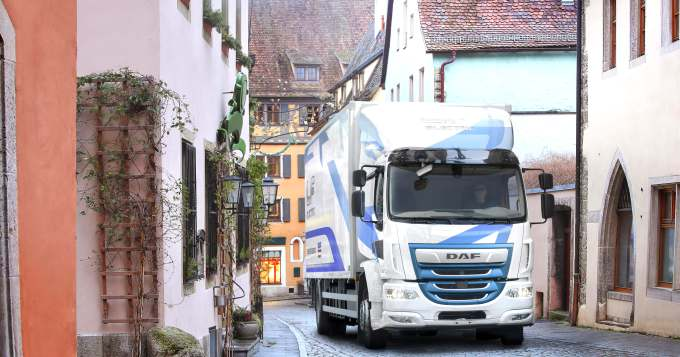 This offers the LF Electric a range of no less than 280 ultra-quiet and ‘zero emission’ kilometers more than enough for the needs of urban distribution transport operators.
This offers the LF Electric a range of no less than 280 ultra-quiet and ‘zero emission’ kilometers more than enough for the needs of urban distribution transport operators.
DAF’s innovations on electric-powered vehicles goes a long way back. DAF was the first European truck manufacturer to commercialize a full electric tractor: the CF Electric (GCW up to 37 tons), primarily for supermarket distribution and inter-urban transportation.
More recently, DAF expanded its EV range with the 6×2 CF Electric rigid with steered rear axle (GVW up to 29-ton design), ideal for ‘zero emission’ waste collection for example.
The CF Electric trucks have already clocked up several hundreds of thousands of kilometers with high profile customers, building DAF’s experience with electric driveline technology. The new LF Electric is DAF’s latest product to feature a full-electric powertrain.
Latest generation batteries
DAF said it uses so-called LFP batteries (Lithium Ferro Phosphate) on all fully electric vehicles. These are batteries of the very latest generation, containing no cobalt or magnesium, in the interests of sustainability.
Additionally, they are better packaged – resulting in a higher energy density per liter – and the chemistry of the battery ensures the highest thermal safety. The LFP batteries come with a 6-year warranty, illustrating DAF’s confidence in terms of performance, reliability and durability.
Slow and fast charging
A special feature of the new DAF LF Electric is the ‘Combined Charging System’. This allows the truck to be charged through the regular electricity network and is ideal when the truck returns to the home base at the end of the day.
Through slow-charging (400V AC, 22 kW, 3 phase), the battery pack can be charged from 20% to 80% in 6.5 hours. A full charge (0% to 100%) takes up to 12 hours. If dedicated equipment is available, fast charging the batteries (650V DC, 150 kW) will only take 60 minutes from 20% to 80% or 2 hours for a full charge.
As an option, the new DAF LF Electric is available with a 400V e-PTO for powering auxiliary equipment such as an electric cooling installation or an electro-hydraulic crane. This eliminates the need of a separate generator and will result in a full ‘zero emission’ distribution truck.
The LF Electric is initially available as a 19-tonne rigid, with a choice of 5.3 or 5.85 meter wheelbases. The truck offers a body & payload allowance of 11,700 kilograms, which is sufficient for the majority of city distribution applications.
It goes without saying that the LF Electric benefits from the same distinctive DNA as its siblings with a combustion engine. Just like every LF, it offers easy entry, excellent all-round visibility, great driver comfort and the tightest turning circle in the industry – and thus excellent maneuverability; it is the perfect truck of every driver in urban distribution.
DAF strengthens global position with growing market share in Europe, Brazil and Taiwan
DAF Trucks strengthened its position as a global commercial vehicle manufacturer in 2020. Market share in the European heavy duty (16 tons+) segment grew to 16.3%, the latest generation trucks were introduced in Taiwan and Brazil, and production of the zero emission CF Electric was announced, illustrating DAF’s environmental leadership.
In 2020, DAF registered 37,580 trucks on a total European heavy duty market of 230,400 vehicles, resulting in a market share of 16.3% (2019: 16.2%), which is the second best achievement in the company’s history. The European medium duty truck market (6 to 16 ton) totaled 41,400 units and DAF’s market share was 9.5% (2019: 9.7%).
Market leader in 6 European countries
DAF continued heavy duty market leadership in the Netherlands (31.8%), the UK (31.6%), Poland (23.7%), Hungary (27.9%) and Bulgaria (25,4%). The Dutch truck manufacturer also gained 2020 market leadership in Portugal (21.8%). DAF is the European leader in tractors and the number one import brand in the two largest truck markets in Europe: Germany and France. Market share in the heavy-duty rigid segment increased to 11.5%.
Sales outside Europe
Last year, DAF sold 5,880 trucks outside the EU and introduced its latest generation vehicles in Taiwan (Euro 6), Brazil (Euro 5) as well as in the Middle East and Africa (Euro 3 and 5). The 10,000th locally assembled truck was delivered in Taiwan, where DAF is the heavy-duty market leader among European manufacturers. DAF is also the market leader in Israel and Belarus. In 2020, DAF sold more than 2,000 PACCAR engines to leading manufacturers of coaches, buses and special vehicles worldwide.
‘Record after record’
“In 2020, we sold a record number of DAF MultiSupport Repair and Maintenance contracts, realized a record PACCAR Financial market share and delivered a record number of DAF Used Trucks to their new owners,” said Richard Zink, member of the Board of Management with responsibility for Marketing and Sales. “Our aim is to further strengthen our leading position, and that is why we are working together with our dealers to strategically expand our network of over 1,100 professional dealers and service points. Last year, for example, our independent dealers opened a total of 45 new dealerships in Europe, South America, Asia and Africa.”
Environmental leadership
In addition to the continued development of combustion engine technology, DAF is investing in the latest technologies for battery and hybrid electric powertrains, supporting lower CO2 emissions and improved air quality in urban areas. In addition, as part of a field test, DAF customers are already benefiting from the advantages of the CF Hybrid truck that employs its zero emissions battery technology when driving in city areas and applies its clean diesel engine on regional routes. DAF announced production of the new CF Electric truck, offering an extended electric range of 200 kilometers and recently introduced the LF Electric with a 280 kilometer zero emission range.
Ready to grow further
In 2020, DAF produced more than 37,600 CF and XF trucks and almost 9,000 LF vehicles. “European truck demand improved in the second half of the year along with the European economies,” according to Harry Wolters, DAF Trucks President.
“It is estimated that the 2021 European truck market will continue to recover and will be in the range of 250,000 – 280,000 trucks. We are ready for further growth by delivering our customers premium quality, exceptional fuel efficiency and superior driver comfort.” (Photos & Text from: www.daf.com)
Emirates SkyCargo, Dubai Airports, DP World and International Humanitarian City join hands to distribute vaccines by air, land and sea within 48 hours to any point of destination around the world
Racing against time to distribute COVID vaccines to even the farthest shores on the planet, Dubai recently took the initiative to launch the Dubai Vaccine Logistics Alliance to speed up the distribution of these vaccines through the emirate, particularly to developing countries struggling to inoculate their people amid scarce resources due to the pandemic.
The pandemic that caused the global economic crisis described as the worst since the Great Depression of the 1930s has so far infected more than 104 million people and claimed the lives of over 2.251 million.
Countries are still struggling to recover from the pandemic’s devastating economic impact which experts believe could take decades to rebuild. Faced with mounting debts, huge unemployment and poverty rates, most cash-strapped nations have yet to obtain COVID vaccines.
Under the directives of Vice President and Prime Minister of the UAE and Ruler of Dubai HH Sheikh Mohammed bin Rashid Al Maktoum, Emirates SkyCargo, Dubai Airports, DP World and the International Humanitarian City will work together to distribute vaccines by air, land and sea.
Their combined expertise, along with strategic global air routes, sea ports and logistics networks, will speed up vaccine deployment, especially to developing nations.
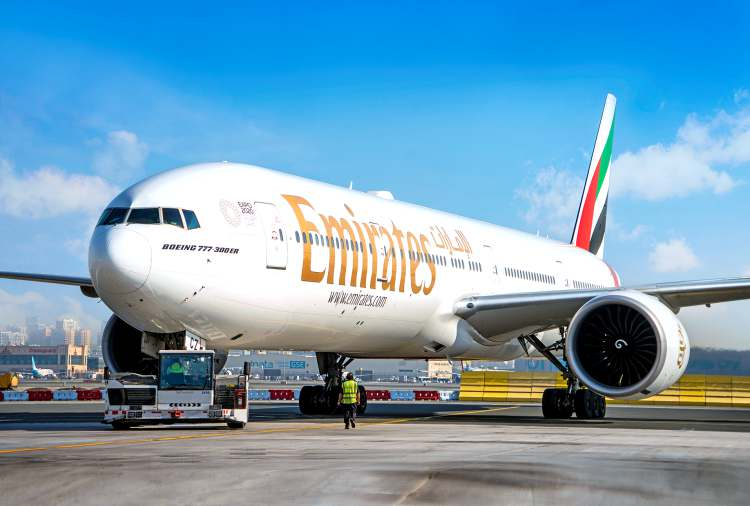 The UAE government made the bid in support of the World Health Organization’s (WHO) COVAX initiative and its efforts to equitably distribute 2 billion doses of COVID-19 vaccines in 2021.
The UAE government made the bid in support of the World Health Organization’s (WHO) COVAX initiative and its efforts to equitably distribute 2 billion doses of COVID-19 vaccines in 2021.
The distribution will particularly focus on emerging markets, where populations have been hard-hit by the pandemic, and pharmaceutical transport and logistics are challenging.
The alliance is working with a broader set of stakeholders including pharmaceutical manufacturers, forwarders, government agencies and other entities for transportation of vaccines.
“We currently stand at the cusp of a historic moment with the rollout of vaccines for countering COVID-19, a pandemic that has disrupted the lives of people around the world. The UAE is leading the world in terms of rolling out the vaccine, and in line with HH Sheikh Mohammed bin Rashid Al Maktoum’s vision to facilitate a global solution for the wellbeing of communities, the Dubai Vaccine Logistics Alliance brings together key organizations to expedite the worldwide transport of urgently needed vaccines through Dubai,” said HH Sheikh Ahmed bin Saeed Al Maktoum, President of Dubai Civil Aviation Authority, Chairman of Dubai Airports and Chairman and Chief Executive of Emirates Airline and Group.
Home to the world’s largest humanitarian logistics hub
International Humanitarian City, the world’s largest hub for humanitarian logistics based in Dubai will be a vital partner in the Dubai Vaccine Logistics Alliance bringing its vast expertise in humanitarian logistics for aid materials such as food and medicine in markets with limited infrastructure. IHC and Emirates SkyCargo have already partnered on many humanitarian cargo flights and earlier in 2020, also signed an MoU for closer collaboration for humanitarian assistance flights.
HE Mohammed Ibrahim Al Shaibani, the Chairman of the Supreme Committee for the Supervision of International Humanitarian City, said: “Under the guidance of His Highness Sheikh Mohammed bin Rashid, International Humanitarian City, based in Dubai, has evolved to become the largest humanitarian hub in the world, playing a pivotal role in facilitating first responses to humanitarian crises across the globe. Since the current global crisis began, the IHC has facilitated the distribution of over 80% of the WHO’s global medical response in the fight against COVID-19.”
“Dubai will make sure this fight continues with the Vaccine Logistics Alliance transporting urgently needed vaccines and medical supplies to the most vulnerable communities across the world, when they need it most. We are all responsible for doing what we can to end this pandemic.”
DP World: The global port & logistics powerhouse
DP World, a leader in global supply chain solutions with ports, terminals and logistics operations on every continent, is joining Dubai’s initiative to transport, store and distribute COVID-19 vaccines.
DP World logistics operations will facilitate the collection of vaccines from manufacturing sites in places like Europe, the US and India and deliver them to airports, seaports and dryports for onward transportation.
DP World’s global, GDP-compliant, network of warehousing and distribution hubs will be used to store vaccines for time and temperature sensitive distribution to hospitals and clinics. DP World will deploy its track-and-trace technology, such as Cargoes Flow, to give real-time information on the location of shipments, and continual temperature control and monitoring. DP World’s ports and terminals, including Jebel Ali in Dubai which is one the largest in the world, will be used to ship, store and distribute medical devices, such as syringes and wipes.
“Humanity will only defeat coronavirus if vaccines can be distributed everywhere. Dubai’s position as a global hub means we have a responsibility to combine our infrastructure and capabilities for this common goal. DP World has kept trade flowing throughout the pandemic ensuring countries received the vital supplies they need. We are proud to use our ports, terminals and smart logistics operations to distribute vaccines and medical devices to contribute to fighting the pandemic,” said Sultan Ahmed bin Sulayem, Group Chairman and CEO, DP World.
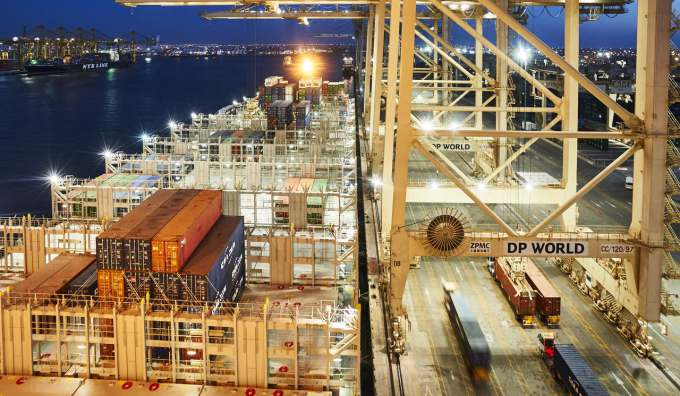 The global leader in air transport
The global leader in air transport
Emirates SkyCargo, a global leader in the air transportation of temperature sensitive pharmaceuticals, including vaccines, has over two decades of experience in transporting pharmaceuticals across the world and has developed extensive infrastructure and capabilities for the secure and rapid transportation of temperature sensitive pharmaceuticals.
“With our modern wide-body aircraft fleet, our network reaching more than 135 cities across six continents including major pharma hubs, and our expertise in handling pharma shipments, we are well placed to work with our partners in the Dubai Vaccine Logistics Alliance in order to make sure that the COVID-19 vaccines are reaching every corner of the globe, especially cities in emerging markets,” said Nabil Sultan, Emirates Divisional Senior Vice President, Cargo.
Emirates SkyCargo has over 15,000 square metres of cool chain space for pharmaceuticals across its terminals in Dubai and has already had a head start for COVID-19 vaccine logistics, having already moved COVID-19 vaccines on its flights during the month of December.
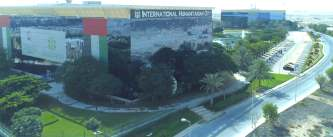 Dubai Airports, operator of Dubai International (DXB) and Dubai World Central (DWC), will be contributing to the efforts of the newly formed Dubai Vaccine Logistics Alliance by providing additional space at dedicated facilities at Dubai International (DXB).
Dubai Airports, operator of Dubai International (DXB) and Dubai World Central (DWC), will be contributing to the efforts of the newly formed Dubai Vaccine Logistics Alliance by providing additional space at dedicated facilities at Dubai International (DXB).
“Dubai’s central location means it is easily accessible to almost 80% of the world’s population within just four hours, making the decision to join forces and develop the world’s preeminent distribution hub a very strategic one,” said Paul Griffiths, CEO of Dubai Airports.
“Over the coming months, there will undoubtedly be a major surge in demand for the efficient, safe and reliable global distribution of high volumes of COVID-19 vaccines, and we wanted to be ready to respond to and accommodate that demand. This alliance is timed perfectly and will not only support a global need, but also support the future of travel.”
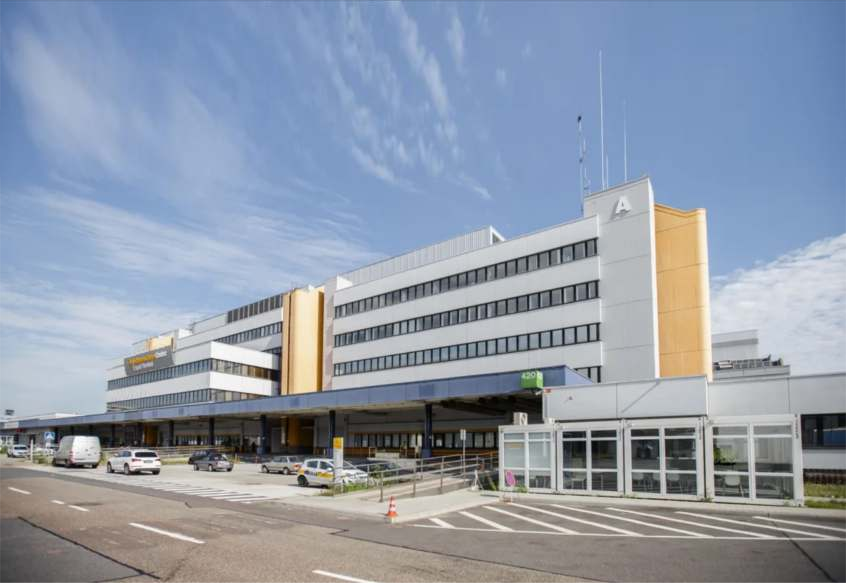 In its more than 26 years in the air cargo industry, Lufthansa Cargo has never been busier than now. Like other airfreight carriers in this time of the pandemic, the airline rose to the challenge of flying vital medical supplies and pharmaceuticals across continents as countries race against time to save lives and prevent the further spread of the COVID virus.
In its more than 26 years in the air cargo industry, Lufthansa Cargo has never been busier than now. Like other airfreight carriers in this time of the pandemic, the airline rose to the challenge of flying vital medical supplies and pharmaceuticals across continents as countries race against time to save lives and prevent the further spread of the COVID virus.
In Financial Year 2020, Lufthansa Cargo revenues rose by 11 percent to EUR2.76 billion, its best result so far since its establishment in 1994. The company’s adjusted EBIT amounted to EUR772 million (previous year: EUR1 million), corresponding to a margin of 28 percent.
This, even as the belly capacity of its allied airlines were lost for many months due to the global travel ban and the lockdown. In 2020, Lufthansa Cargo said it sold 6.5 billion freight ton kilometers (-27 percent). Average load factor improved by 7.8 percentage points to 69.1 percent, while cargo capacity shrank by 36 percent.
Working closely with passenger airlines within the Lufthansa Group—Lufthansa, Austrian Airlines, Brussels Airlines and Eurowings—Lufthansa Group also made hundreds of flights using passenger planes converted as freighters temporarily to transport goods.
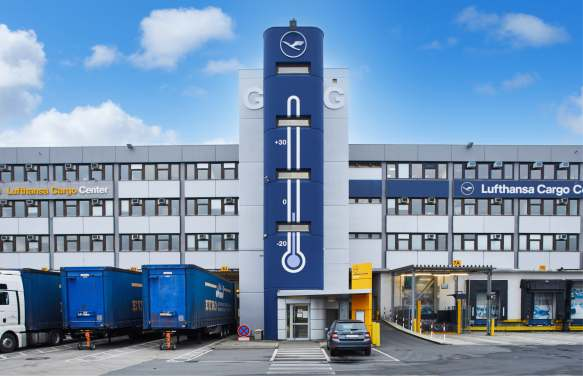 Dorothea von Boxberg, Chairperson of the Executive Board and Chief Executive Officer of Lufthansa Cargo, who officially assumed her new role on March 1, said, “We are pleased to close what was probably the most challenging year in our company’s history with a record result. It is also a record in terms of the commitment and flexibility of our workforce—and we are proud of the outstanding cooperation with our long-standing partners and customers.”
Dorothea von Boxberg, Chairperson of the Executive Board and Chief Executive Officer of Lufthansa Cargo, who officially assumed her new role on March 1, said, “We are pleased to close what was probably the most challenging year in our company’s history with a record result. It is also a record in terms of the commitment and flexibility of our workforce—and we are proud of the outstanding cooperation with our long-standing partners and customers.”
At the company’s annual press event held virtually for the first time on March 5 due to the extraordinary circumstances we now live in, von Boxberg underscored the airline’s plan to move forward with digitalization along its entire transport chain.
“This success enables very decisive investments in our future. We want to make airfreight sustainably better and further strengthen our home base in Frankfurt. That is why we will gradually modernize our cargo center in the coming years and continue to drive forward digitalization along the entire transport chain,” she said.
The company is optimistic sustaining growth made in 2020 with demand for air cargo still high. Volumes from China remain strong and consumer confidence in Europe is still stable.
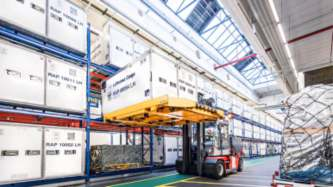 “Airfreight is a very volatile business,” said von Boxberg. “But for this year, we can say that we will have a good year in airfreight again although it will probably not quite stay at the record levels we have seen in the past months. People will import more.”
“Airfreight is a very volatile business,” said von Boxberg. “But for this year, we can say that we will have a good year in airfreight again although it will probably not quite stay at the record levels we have seen in the past months. People will import more.”
Upgrading Frankfurt’s cargo center
At the heart of Lufthansa Cargo’s airport-to-airport airfreight business, which serves around 300 destinations in more than 100 countries with its own fleet of freighters and the belly capacities of passenger aircraft operated by Lufthansa German Airlines, Austrian Airlines, Brussels Airlines, Eurowings and SunExpress, is Frankfurt Airport.
The airport is home to Lufthansa Cargo Center which begun undergoing modernization in January 2021 following the approval of the Supervisory Board of the German airfreight company to invest on the infrastructure.
The center’s comprehensive infrastructure modernization project is expected to be completed by 2028. It involves not just new buildings, but upgrades to existing building sections and warehouses, as well as improvements on logistics systems and internal material flows, thus, making Lufthansa Cargo’s operations even faster and more efficient.
 Lufthansa’s Cargo Center in Frankfurt handles about 80 percent of its global freight volume. The increasing shipments for e-Commerce, new product requirements and the airline’s commitment to digitalization prompted the center’s upgrading, officials said.
Lufthansa’s Cargo Center in Frankfurt handles about 80 percent of its global freight volume. The increasing shipments for e-Commerce, new product requirements and the airline’s commitment to digitalization prompted the center’s upgrading, officials said.
Fleet modernization
Continuing with its fleet modernization program, von Boxberg also disclosed Lufthansa Cargo is adding another Boeing-777F to its freighter fleet.
The twin-engine B-777F plane is the most efficient freighter in its class. It’s scheduled to arrive by fall 2021 in Frankfurt where it will also be stationed.
“This year, we will add another highly efficient Boeing 777F aircraft to our freighter fleet. In doing so, we will also secure jobs in the cockpit and in other areas,” von Boxberg announced.
The new plane is a welcome addition to Lufthansa Cargo’s freighter fleet with increasing demand for air cargo. It will also complement bellyhold capacities of Lufthansa Airlines, Austrian Airlines, Brussels Airlines, Eurowings and SunExpress, to meet customers’ demand.
“Now that we are optimally positioned with one of the world’s most modern freighter fleets, we will work with our customers to drive forward the regular use of sustainable fuels,” von Boxberg said. In November 2020, Lufthansa Cargo had already become the world’s first cargo airline to operate a rotation fully compensated with Sustainable Aviation Fuel (SAF).
Fleet modernization is not confined to Lufthansa Cargo with Lufthansa Airlines considering to ditch older aircraft. The CEO of Deutsche Lufthansa AG or Lufthansa Group, Carsten Spohr, described 2020 as “the most challenging in the company’s history” and “2021 will be a year of redimensioning and modernization for us.”
“The unique crisis is accelerating the transformation process in our company. 2021 will be a year of redimensioning and modernization for us. The focus will remain on sustainability: We are examining whether all aircraft older than 25 years will remain on the ground permanently,” Sporh said in a statement.
“From the summer onwards, we expect demand to pick up again as soon as restrictive travel limits are reduced by a further roll-out of tests and vaccines. We are prepared to offer up to 70 percent of our pre-crisis capacity again in the short term as demand increases. With a smaller, more agile and more sustainable Lufthansa Group, we want to maintain our leading position worldwide and secure the jobs of around 100,000 employees in the long term,” he added.
In an extremely challenging environment for the entire aviation industry, the Lufthansa Group’s logistics subsidiary succeeded in maintaining its global connections with cargo aircraft at all times. The cargo airline countered the pandemic-related, continuous changes in entry regulations for crews, for example, with extremely flexible network planning, officials said.
Rolling out vaccines worldwide
While the global distribution of medical supplies remains a high priority, airfreight carriers are also tapped to distribute COVID-19 vaccines around the world.
The International Air Transport Association (IATA) described the COVID vaccine distribution as the “mission of the century” saying just a single dose needed to provide for 7.8 billion people across the planet would fill 8,000 B-747 cargo aircraft.
The international trade body said careful planning, well-established global time and temperature-sensitive distribution systems are needed not just on air but on land as well to safely deliver the vaccines.
Lufthansa Cargo said it has created a new product specifically for COVID-19 vaccine transports. The product called COVID-19 Temp Premium was opened for booking since 11 January 2021. It provides a high level of comprehensive and personalized customer service along the travel chain, including seamless monitoring of vaccine shipments throughout the entire process and a 24/7 after sales support.
Drawing on its many years of experience in handling medical goods and pharmaceuticals in addition to having some of the best cold storage facilities at varying temperatures, Lufthansa Cargo is also capable of handling larger volumes of vaccines fast and safely.
The company added it has already invested heavily in its temperature control facilities, including the brand new Lufthansa Cargo Pharma Hub Munich as well as the recently extended and upgraded Lufthansa Cargo Pharma Center Chicago at O’Hare International Airport.
Furthermore, with its pharmaceutical hubs and up to 200 other stations with Active Temp Control or Passive Temp Support services worldwide, Lufthansa Cargo has one of the world’s largest airline pharmaceutical networks. 30 of these stations are already CEIV Pharma-certified.
At least seven different types of COVID vaccines have been approved for roll-out as of February 2021. Various data showed nearly 400 million doses have been distributed across 122 countries. The World Health Organization said more than 200 additional vaccine candidates are in development, of which more than 60 are now in clinical development.
But despite billions invested in producing COVID-19 vaccines by different governments and philanthropists, there remains a massive shortage due to scarce resources in producing them. In the US, for instance, both Moderna and Pfizer’s vaccines which contain billions of lipids, are experiencing shortage of lipid supplies because only a handful of factories produce them.
There has also been reports of shortage of glass vials to store the vaccines, syringes among other medical supplies. And the air cargo industry must deliver them as well fast and safely.
Dorothea von Boxberg: Lufthansa Cargo’s new CEO & Chairperson of the Executive Board
Dorothea von Boxberg has been the Chairperson of the Executive Board and CEO of Lufthansa Cargo AG since 1 March 2021. Her responsibilities include Business Development and Cooperation, Legal Affairs, Communications and Corporate Responsibility, Information Management and Digital Transformation, as well as Finance and Controlling.
Born in 1974, von Boxberg studied Industrial Engineering at TU Berlin and as part of a double degree program at ESCP Paris.
She began her professional career in 1999 at the strategic management consultancy Boston Consulting Group. She worked in various industries and several countries.
In 2005, she left to join the Star Alliance management company, where she was responsible for strategy.
In August 2018, von Boxberg was appointed to the Executive Board of Lufthansa Cargo AG as Chief Commercial Officer. Her areas of responsibility included Global Sales, Revenue Management and Pricing, Product Development, Network Planning, and Handling outside the Frankfurt and Munich hubs. The digitalization of commercial processes and the expansion of multi-channel sales were among the most important tasks.
Harald Gloy has been appointed to the Executive Board of Lufthansa Cargo AG for a further five years. The company’s Supervisory Board unanimously extended his contract until 31 December 2026. In addition to responsibility for Operations, Gloy has also assumed the role of Chief Human Resources Officer as of 1 March 2021 and thus, as part of a restructuring within the Cargo Executive Board, will henceforth also bear responsibility for Human Resources and Procurement at the company.
“We are very pleased that with Harald Gloy we will have an outstanding appointment to the Operations and Human Resources departments at Lufthansa Cargo for another five years,” said Harry Hohmeister, Member of the Executive Board of Deutsche Lufthansa AG and Chairperson of the Supervisory Board of Lufthansa Cargo AG.
Gloy has been with the Group since 1999 and was appointed Chief Operations Officer of Lufthansa Cargo AG on 1 January 2019. Previously, the 48-year-old industrial engineer held various management positions at Lufthansa Technik.
JAS Worldwide has announced the appointment of David Bang as executive vice-president, global pharma & healthcare.
An innovative thought leader with more than 20 years of experience across logistics, supply chain, healthcare, and life sciences industries, he has held various leadership positions throughout his career.
In 2005, Bang co-founded LifeConEx, a joint venture between DHL and Lufthansa Airlines for bio-pharma international logistics. He became the CEO of the company in 2006, substantially expanding the network to more than 100 stations in 65 countries.
Most recently, Bang was global VP strategic development for Hellmann where he spearheaded the global development of their healthcare network.
“David’s extensive accomplishments and leadership in the Pharmaceutical and Healthcare sectors, along with his vision and passion for developing programs that deliver value to pharma and healthcare manufacturers and distributors, makes him the perfect candidate to build and lead this vertical”, said JAS chief commercial officer, Carol Kijac. “We are very excited to have someone with his talents and skills join our team.”
The Boeing Company board of directors recently announced that directors Arthur D. Collins Jr. and Susan C. Schwab will retire from the board when their terms expire and will not stand for reelection at the company’s Annual Meeting of Shareholders. The board also named chairs to its six board committees, to take effect following the yearly voting for the election of directors at Boeing’s annual shareholder meeting, which is scheduled to occur on April 20.
“We are grateful for Art and Susan’s distinguished service on our board,” said Boeing Chairman Larry Kellner. “Boeing has benefited enormously from their committed and dedicated service.”
Collins joined the board in 2007 and most recently chaired the Compensation Committee and served as a member of the Governance, Organization and Nominating Committee. Schwab joined the board in 2010 and most recently served as a member of the Compensation Committee, and the Governance, Organization and Nominating Committee.
“It has been a privilege to serve alongside Art and Susan,” said Boeing President and CEO David Calhoun. “They made meaningful and lasting contributions to our company, and to the aerospace industry, which is foundational to the global economy.”
“In line with our thorough succession planning process, the board will continue to take steps to identify a pipeline of diverse candidates with appropriate expertise who bring qualified perspectives,” Kellner added.